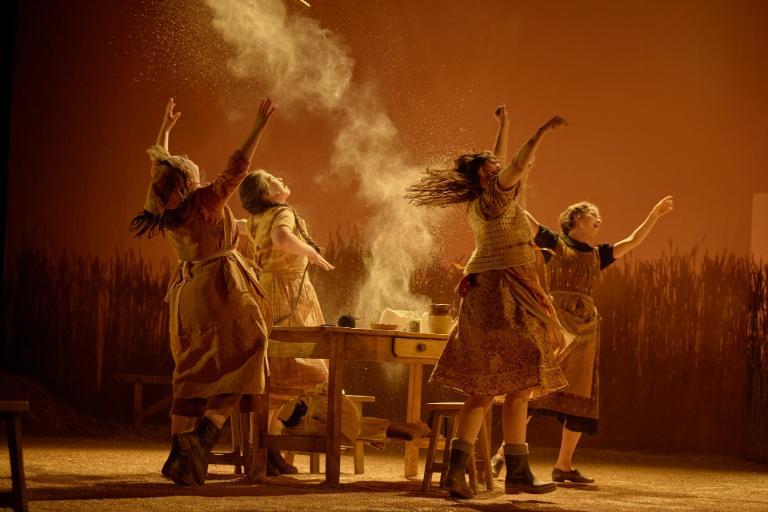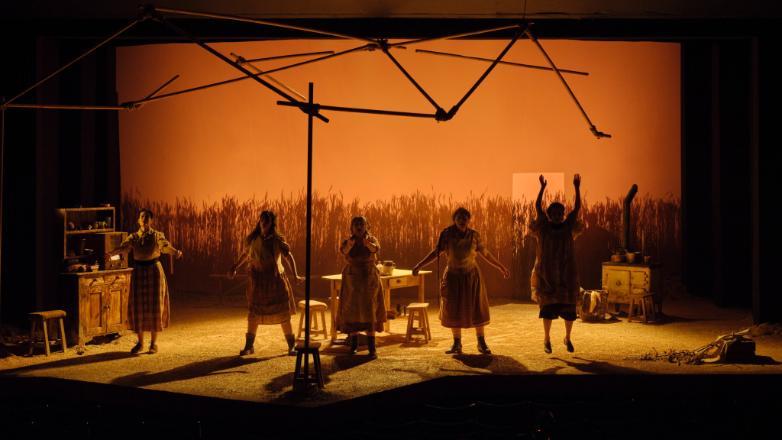In This Section
Éadaoin Fox: ‘Make work that genuinely excites you and that you love’
.jpg)
- Spotlight on UCC Drama and Philosophy graduate Éadaoin Fox
- Theatre and Film Director is currently working as assistant director on critically acclaimed Dancing at Lughnasa at The Gate Theatre Dublin.
- Éadaoin is collaborating with leading cast, crew and creative team that includes Caroline Byrne, Jean Butler and Paul Keogan.
Brian Friel’s moving and heartwarming masterpiece about family, home and belonging returns to the Gate Theatre Dublin for the first time in over 20 years.
The timeless drama about resilience and courage has received widespread acclaim as audiences connect with the new production, directed by UCC alumni Caroline Byrne with Eadaoin Fox acting as assistant director.
Éadaoin Fox is a theatre and film director from Cork. She graduated from University College Cork with BA in Drama and Philosophy, and she aims to make dynamic and sustainable work that focuses on amplifying the interdisciplinary nature of theatre and film.
As Assistant Director, Éadaoin plays an essential role in delivering the creative vision of the play, collaborating closely with director Caroline Byrne, the cast, crew and creative team.
Éadaoin explained: “My favourite part of the job is engaging with the processes and practices of Caroline, the actors and the rest of the team. Collaboration is such an fulfilling, efficient and surprising way to make art. Prompted by Caroline’s vision, I got to observe how multiple perspectives amalgamate and converse to uncover different insights of the text, and how that process can offer different compositional modalities, which can then be scaffolded within the performance.”
“The chance to observe many minds coming together to protract performative and compositional dimensions from the text that all cohere and link dramaturgically was an incredible experience. Caroline has a resoundingly clear understanding of how to guide that. As an assistant director, it was really exciting to engage with Caroline’s practice and offer my own contribution to it.”

Molly Logan, Nicky Harley, Lauren Farrell, and Zara Devlin in the Gate's production of Dancing at Lughnasa. Picture: Ros Kavanagh
The power of a collaborative creative process
Dance leaps out of play, with the most celebratory and celebrated scene bringing the five sisters together.
“Working on the dance was a really special experience. The play is so layered and multi-dimensional. Before I thought that there is so much psychologically that could be mined from the text that it felt like there would always be more to discover. However, more accurately I think that Friel is able to present what is ineffable about the human condition in the play and how he writes. He uses the mode of dance to express the ineffable and is in my opinion, incredibly successful at doing so.”
“The idea of the ancestral spirits arises multiple times in the text - looking at the dance, Caroline, Sue Mythen the movement director, and Jean Butler expanded the mention of this idea into the DNA of the production. This production’s version of the infamous dance truly encapsulates the essence of the ineffability that Friel is alluding to. Without being explicit or prescriptive, the dance sparks the audience to think of their ancestors in spirit, but also it encourages them to remember who they were as people. It particularly asks us to recall our female ancestors and how they navigated and resided within society that may have constricted them. It honors the wide spectrum of emotions that coincides with our ancestors' experience of life, and the fullness and impact that their lives have on us today. Ultimately it creates an intuitive connection between them and us. This production’s elicitation of the dance truly communicates the ineffability of intuition and challenges our interpretation of the play whilst honoring it in totality. At the front of the play text Friel writes ‘In memory of those five brave Glenties women’. I think that’s very intentional.”
“Being present in the room while the team, the actors, Caroline, Sue and Jean worked on the dance was an incredibly emotional and profound experience. I got to observe the construction of the dance and by proxy, the conjuring of our ancestors in the making. Trying to articulate that experience or describe it further would be void - you will have to go and see it to understand. The actors deliver a completely astounding and prodigious performance in the dance and in the production overall. They are the conduit between us and our ancestors.”

Dancing at Lughnasa at The Gate Theatre Dublin, set and costume designed by Chiara Stephenson. Image: Ros Kavanagh
Advice for emerging theatre makers
Sharing advice with aspiring theatre makers, performers or directors, Éadaoin said: “Persistence is key I think. Try to make as much work as you can whatever way you can. Make work that genuinely excites you and that you love. It’s challenging. You have to be very dogged and diligent about it. Invite people you admire to see the work you make. Creatives in the industry are lovely and want to help if they can.”
Reflecting on her time at UCC, Éadaoin fondly recalls collaborating with fellow students: “The process of making my FYP, spending all those amazing hours with the wonderful women I made it with, and bringing Disco Pigs to the Student Drama Awards in Belfast and performing it in the Brian Friel Theatre.”
Learn more about UCC's Theatre and Performative Practices degree.
College of Arts, Celtic Studies & Social Sciences
Coláiste na nEalaíon, an Léinn Cheiltigh agus na nEolaíochtaí Sóisialta
Contact us
College Office, Room G31 ,Ground Floor, Block B, O'Rahilly Building, UCC
